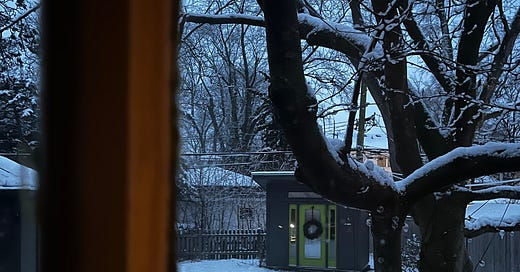Burning candle of oak moss and amber. Space heater at my feet. Early morning gray light and snow cone flurries falling at the window. The shed is chilled, and I wear my watch cap and winter vest to meet the weather. If this were the temperature in the house, I certainly would complain. But here, it is in the spirit of a winter morning.
With me is a cortado from the kitchen and a slice of brown bread with a touch of blackberry jam. At the small wooden desk, I sit, the snow has buffered the world, a kind of silence is around me, save the occasional rumble of a salt truck along the road. The shed is a cocoon, a nest. This little 8x10 sanctuary with books stacked behind me, leather journals—some filled with forgotten words, others awaiting new ones, many of them gifts, arranged against the wall and window on the desk. I wish to be a better journaler, more consistent, but seem never to find the rhythm. Still, I love them. They are like little holy books, touchstones for an artistic-laden heart. At my right is an old typewriter, a Smith-Corona Skyriter. Poems come alive on its keys from time to time, the tactile delivery of the mysterious. Poetry arrives from somewhere uncertain, unbridled, out of the mist. T.S. Eliot said, “Poetry can communicate before it is understood.” I think of this many times when my meager ability struggles to make sense of what I’ve written. Across from the typewriter is a black paraffin oil lamp. I don’t use it much, but I am drawn to it. Like the typewriter, it’s a tactical instrument, a tool, and I admire the process it requires, a slowing down of the mind in order to produce an outcome. The shed itself permits this for me. It eases my senses, changes my pace, like a cup of tea by a fire.
On the roof above, I hear the slide of gathered snow. It’s wet and slippery and the accumulation cannot hold, so it slides and with the movement comes a kind of pop and crunch. It’s music with an ever-changing time signature. And then there are the squirrels. They scurry above, leaping from the big trees to the shingles, tiny feet skittering. In the first hours of light on a soft winter morning, all of this is comfort—the snow, the squirrels, the candle, the silent typewriter, the books, the journals, the chill. The shed is a temple, a place of sanctuary.
I have been a winter person. And as I age, like many others, winter is less of a pleasant experience. But those first days of real snow. like this one, carry a beauty and serenity that is not always easy to understand. Like my shed, you might think. Not everyone would find my little shed a pleasant experience, especially on a morning where the weather challenges you. Yet, like the first snow of the season, it, too, holds to beauty and serenity.
I am drawn to the solitary and remote. The sheds and tiny workspaces of writers and artists have forever intrigued me. Bernard Shaw had a hut. Jackson Pollock had his small studio-barn. Salvador Dali worked in a small fisherman’s hutch in Catalonia, Spain. And Dylan Thomas’ boathouse in Wales, the space that inspired my shed, the whitewashed ceiling, the singular window, the small desk, remains an inspiration. Dylan’s simple workspace hangs on a hill above the Taf Estuary in Laugharne. It’s part of the town, yet marginally remote, sitting alone along a secluded road. The remoteness, if only the relativity of it, is so very appealing. I would find a tiny stone home on a rugged island in the Irish Sea more than glorious. Or a small casita far into the clouds above the Northern New Mexico mountains a sacred retreat. Take me to a small and rugged cabin in Montana, or a seaside one-room cottage on the Oregon coast. A bothy in the desolate, treeless Scottish Highlands. Or, as I watch the morning’s wet snow fall across the windowpane, I’m reminded of a secluded hut along the craggy rocks in a most remote region of the Norwegian coast, in the stark and snowy Lyngen Alps, a former lighthouse cabin, where anyone can stay, as long as they want, if you can get there. In the winter, it takes more than an hour of snowshoeing to reach it.
I may never know all these places, these havens and their charming, snug, cozy, enchanting, or magnificent calls. But I have my shed, and I have this winter morning, my coffee, a candle, my journals, my pen. Out the window, I see footprints in the snowy slush, planted there before dawn, evidence of an arrival on winter morning, a purposeful little journey to my own level of remoteness. And now as more of the day’s light emerges under the cloud-shrouded sun, I hear a neighborhood crow cawing, a messenger, a sign that the universe is noticing the divine.
David W. Berner is the author of several award-winning books of fiction and memoir. His memoir, Daylight Saving Time: The Power of Growing Older is to be published in July 2024 by Collective Ink Books.





Thanks for writing this piece. I sit in my little adobe house looking out at the snowy mountains of Northern New Mexico. I'm glad you mentioned my place in your essay. Love how you take me around the world to writer cabins.
Your writing is lyrical. Both peaceful and invigorating. This essay is a true gift for all the artists at heart, who yearn for time to create, away from the hubbub.